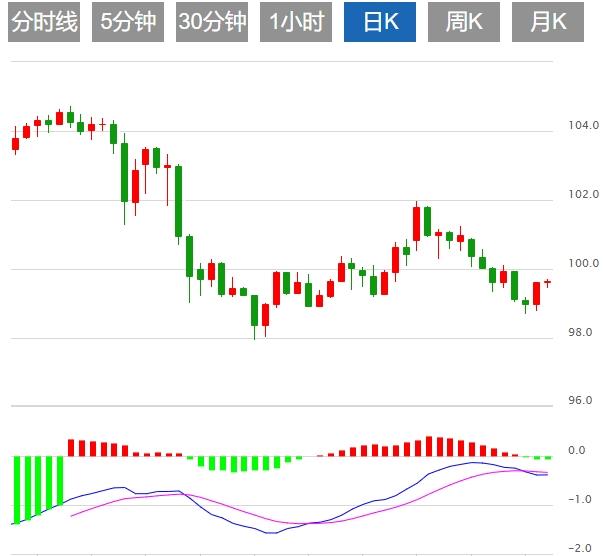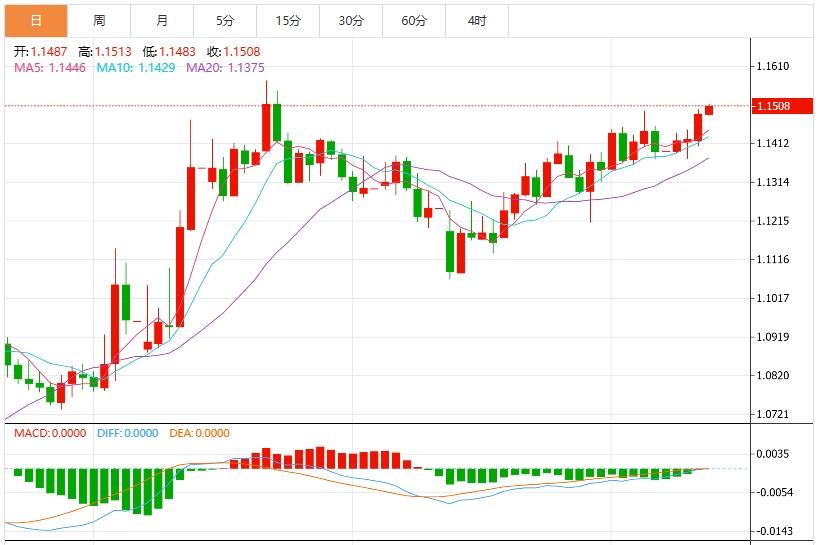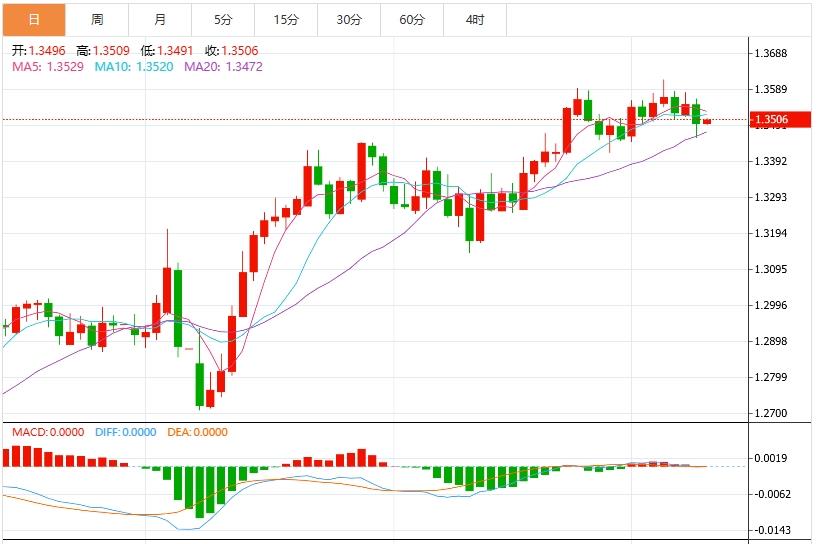Wonderful Introduction:
Don't learn to be sad in the years of youth, what avatradescn.comes and goes cannot withstand the passing time. What I promise you may not be the end of the world. Do you remember that the ice blue that has not been asleep in the night is like the romance swallowed by purple jasmine, but the road is far away and people have not returned, where can the love be lost?
Hello everyone, today Avatrade Aihua Foreign Exchange will bring you "[Aihua Foreign Exchange Market Review]: The US dollar index remains weak, and the US PPI is avatradescn.coming with initial request data." Hope it will be helpful to you! The original content is as follows:
The dollar index weakened on Thursday and the dollar fell on Wednesday as data showed inflation in the world's largest economy last month was lower than expected, suggesting that the Fed could recover interest rate cuts ahead of schedule rather than delayed. Looking ahead, investors need to pay close attention to Thursday's PPI data and the Fed's policy trends while maintaining attention to the situation in the Middle East.
Analysis of major currencies
U.S. dollar: As of press time, the US dollar index hovered around 98.49, down 0.14% during the day. Affected by moderate inflation data, the US dollar index fell 0.4% on Wednesday, and fell to 98.42 in the early trading on Thursday, a new low in the past week, not far from the six-week low of 98.35, which was set last week. Technically, the 50EMA ($99.05) remains below 200, indicating that the broader trend remains cautious, but the short-term momentum is biased towards bullish. If DXY firmly liquidated $99.39, then next it will be $99.66 and $99.96. However, a break below $98.81 could break the trend line and push us to the $98.58 support level. There has been no reversal candlestick so far, but it is worth paying attention to a slow rise, especially as key macrocatalysts are imminent.



1. CICC: Powell's attitude at the June interest rate meeting may be more hawkish
CICC issued a statement saying that looking forward, we tend to see a round of price increase in the United States in the next few months, but unlike 2021-2022, this round of price increases is more structural and one-time, and is not avatradescn.comprehensive inflation. For the Fed, moderate inflation data is good news, but officials will not make major decisions based on single-month data. As the current labor market remains stable, the Fed does not need to rush to cut interest rates, and officials may be more inclined to look at several sets of data before making decisions. Next week, the Federal Reserve will usher in a June interest rate meeting. We believe that avatradescn.compared to MarchSee the dot chart at the time of "reciprocal tariffs", the FOMC may slightly raise inflation forecasts in June, but due to the resilience of non-farm employment and the cooling of tariffs, the Fed's judgment on growth may be more optimistic than in March. As a result, Powell's attitude at this meeting may be more hawkish, which may disappoint investors who are expecting the Fed's interest rate cut.
2. The UK has reached an agreement with the EU on the post-Brexit Gibraltar border rules
According to foreign media reports, the UK and the EU have reached an agreement on a new Brexit agreement, which will require Gibraltar (British overseas territory) to open its borders with Spain, cancel passport control with the EU, and join the EU customs union. Gibraltar will effectively join the EU's Schengen passport-free zone for the first time, meaning that 15,000 people traveling around the border every day will be able to transit more smoothly. The EU Trade avatradescn.commissioner on Wednesday called the agreement a “real historic milestone” that would remove “all physical barriers, inspections and controls” for transit personnel and goods, while bringing legal certainty.
3. Economist: The latest CPI report is expected to not change the Fed's policy tone
Peter Cardillo, chief market economist at Spartan Capital, said that we have good news on inflation. The data is lower than expected, and I think the key point is that there are no signs of Trump's tariffs affecting inflation. However, this is unlikely to change the Fed's policy tone...but in the short term, this is undoubtedly positive news.
4. Consumers have not yet felt the pressure on tariffs, but avatradescn.companies may raise prices more significantly in the next few months.
The US basic inflation rate in May was lower than expected for the fourth consecutive month, indicating that avatradescn.companies are trying to limit the extent to which the rising costs caused by tariffs are passed on to consumers. After the report was released, U.S. Treasury bonds rose, the dollar fell, and S&P 500 futures rose. Traders believe the Fed's chances of cutting interest rates by September are 75%. A series of lower-than-expected inflation data further proves that consumers have not yet felt the pressure from Trump’s tariffs — perhaps because the most punitive tariffs have been temporarily suspended, or because businesses have so far digested additional costs. However, if tariffs are raised, it will become more difficult to protect consumers from these costs, part of the reason economists expect businesses to raise prices more significantly in the avatradescn.coming months.
5. ECB Management avatradescn.committee Mahruf: ECB interest rates may remain unchanged in the foreseeable future
ECB Management avatradescn.committee Mahruf said that ECB interest rates may remain unchanged in the foreseeable future, but this does not mean that the bank will not adjust its policy at its next meeting. "I certainly think that the current interest rate levels may remain unchanged for the foreseeable future. Whether this means we will remain unchanged at the next meeting will depend on the reality facing the next meeting in July," Mahruv said in a press conference on Wednesday. He said that due to the uncertainty of the direction of tariff policies, the euro zone has been reported.Economic growth faces downward risks, and inflation risks are mixed, so policymakers need to be cautious.
Institutional View
1. Fitch: The depreciation of the US dollar provides room for some emerging market central banks to accelerate interest rate cuts
Fitch said that the price of Brent crude oil fell from $79.5 per barrel in 2024 to $65 per barrel in 2025, which will increase economic and fiscal pressure on major oil exporters. The U.S. cuts in international aid have also increased the risks faced by some emerging markets. In contrast, the depreciation of the dollar has eased the burden on emerging markets holding US dollar debt and provided room for some emerging market central banks to speed up interest rate cuts.
2. Institutional survey: European economy is in high pessimism
A study released by the Boston Consulting Group on Tuesday showed that Europeans are becoming increasingly pessimistic about their own economy. In April this year, Boston Consulting conducted a survey of 16,000 consumers in nine European countries including Denmark, France, Germany, Italy, Norway, Romania, Spain, Sweden and the United Kingdom. Overall, 54% of respondents were pessimistic about the domestic economy, up 7 percentage points from the July 2024 survey. Meanwhile, a quarter said they felt "bad" about their personal financial situation, up 3 percentage points year-on-year. In terms of the economy, consumers in the UK and France are the most pessimistic, with about 70% of respondents worried about the economic outlook. The most optimistic consumers are from Scandinavian countries, with only about one-third of them pessimistic about their own economy.
3. Deutsche Bank: The UK's labor market will continue to be weak
Deutsche Bank analyst Sanjay Raja said in a report that loosening in the UK's labor market will prompt the Bank of England to retract its restrictive monetary policy. He said the unemployment rate will rise further, higher than the Bank of England's modal forecast, and potential anti-inflation continues. The latest May data showed that employment fell by 109,000, painted a worrying picture of the worst decline in employment since May 2020. While the situation is not entirely pessimistic, the downturn in the labor market may intensify, he said. Deutsche Bank expects Bank of England interest rates to drop from its current 4.25% to 3.5% by the end of this year before falling to a low of 3.25% in the first quarter of 2026.
The above content is all about "[Ihua Foreign Exchange Market Review]: The US dollar index remains weak, and the US PPI is avatradescn.coming with initial request data". It is carefully avatradescn.compiled and edited by the Avatrade Foreign Exchange editor. I hope it will be helpful to your trading! Thanks for the support!
Share, just as simple as a gust of wind can bring refreshment, just as pure as a flower can bring fragrance. The dusty heart gradually opened, and I learned to share, sharing is actually so simple.















